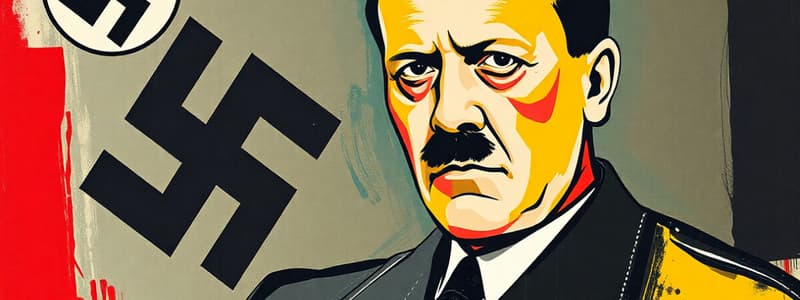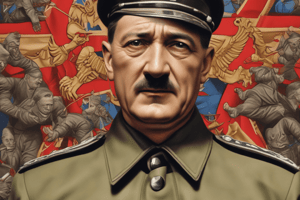Podcast
Questions and Answers
What percentage of the vote did Hitler receive in the 1932 presidential election?
What percentage of the vote did Hitler receive in the 1932 presidential election?
- 35% (correct)
- 24%
- 44%
- 18%
What significant political change occurred in January 1933?
What significant political change occurred in January 1933?
- New civil liberties were introduced.
- The Weimar Parliament was dissolved.
- Adolf Hitler was appointed Chancellor. (correct)
- Paul von Hindenburg resigned.
Which event in February 1933 was used as a pretext for expanding government powers?
Which event in February 1933 was used as a pretext for expanding government powers?
- The presidential election.
- The formation of a coalition.
- The Reichstag fire. (correct)
- The appointment of Hitler.
What did the Reichstag Fire Decree do?
What did the Reichstag Fire Decree do?
How did Hitler's party, the Nazis, fare in the March 1933 election?
How did Hitler's party, the Nazis, fare in the March 1933 election?
What was the nature of the Weimar Republic's political system?
What was the nature of the Weimar Republic's political system?
Who was President of the Weimar Republic during Hitler's appointment as Chancellor?
Who was President of the Weimar Republic during Hitler's appointment as Chancellor?
What role did coalitions play in the Weimar Republic?
What role did coalitions play in the Weimar Republic?
What was Paul von Hindenburg's view of Adolf Hitler prior to his appointment as Chancellor?
What was Paul von Hindenburg's view of Adolf Hitler prior to his appointment as Chancellor?
In what context did Hindenburg use his emergency powers?
In what context did Hindenburg use his emergency powers?
What event marked the beginning of The Great Depression?
What event marked the beginning of The Great Depression?
What significant legislation was passed by the Parliament that gave Hitler unlimited legislative powers?
What significant legislation was passed by the Parliament that gave Hitler unlimited legislative powers?
What political party was increasingly gaining influence in Germany during the late 1920s?
What political party was increasingly gaining influence in Germany during the late 1920s?
What action did Hitler take while he was in jail?
What action did Hitler take while he was in jail?
What event is described as a catalyst for Hitler's rise to full control?
What event is described as a catalyst for Hitler's rise to full control?
Which of the following best describes Hitler's status in Germany by July of 1933?
Which of the following best describes Hitler's status in Germany by July of 1933?
What was the impact of hyperinflation in Weimar Germany by the time Hitler was released from jail?
What was the impact of hyperinflation in Weimar Germany by the time Hitler was released from jail?
What happened to civil rights in Germany following the passing of the Enabling Act?
What happened to civil rights in Germany following the passing of the Enabling Act?
What was the consequence of economic turmoil on political parties?
What was the consequence of economic turmoil on political parties?
How did Hitler's influence grow after he was released from jail?
How did Hitler's influence grow after he was released from jail?
Who was the President of Germany who had some power to check the Chancellor's authority before his death?
Who was the President of Germany who had some power to check the Chancellor's authority before his death?
What method did the Nazis use to consolidate their power in Germany?
What method did the Nazis use to consolidate their power in Germany?
What notable parliamentary elections occurred in 1930 in Germany?
What notable parliamentary elections occurred in 1930 in Germany?
What interpretation exists regarding the role of Marinus van der Lubbe in the Reichstag Fire?
What interpretation exists regarding the role of Marinus van der Lubbe in the Reichstag Fire?
What significant trend can be associated with the rise of the Nazi party during economic crises?
What significant trend can be associated with the rise of the Nazi party during economic crises?
Which political outcome was achieved by the Reichstag following Hitler's rise?
Which political outcome was achieved by the Reichstag following Hitler's rise?
What was the primary reason for the Nazis being relatively small players in politics before 1930?
What was the primary reason for the Nazis being relatively small players in politics before 1930?
What was one result of Hitler's control after the Enabling Act was passed?
What was one result of Hitler's control after the Enabling Act was passed?
What is the relevance of the publication of Mein Kampf in Hitler's political career?
What is the relevance of the publication of Mein Kampf in Hitler's political career?
What year did the Parliament pass the Enabling Act?
What year did the Parliament pass the Enabling Act?
Flashcards
Beer Hall Putsch
Beer Hall Putsch
Hitler's failed attempt to overthrow the Weimar Republic in 1923 by seizing power in Munich.
The Great Depression
The Great Depression
A period of severe economic decline and unemployment that affected the entire world, beginning in 1929.
Black Tuesday
Black Tuesday
The U.S. stock market crash that is often considered the beginning of the Great Depression. It occurred on October 29th, 1929.
Reichstag
Reichstag
Signup and view all the flashcards
Nazi Party
Nazi Party
Signup and view all the flashcards
Mein Kampf
Mein Kampf
Signup and view all the flashcards
Gold Standard
Gold Standard
Signup and view all the flashcards
Protectionism
Protectionism
Signup and view all the flashcards
Totalitarianism
Totalitarianism
Signup and view all the flashcards
Nationalism
Nationalism
Signup and view all the flashcards
Weimar Republic's Political System
Weimar Republic's Political System
Signup and view all the flashcards
Parliamentary Majority
Parliamentary Majority
Signup and view all the flashcards
Coalition Formation
Coalition Formation
Signup and view all the flashcards
Nazi's Rise to Power
Nazi's Rise to Power
Signup and view all the flashcards
Hitler's Presidential Run
Hitler's Presidential Run
Signup and view all the flashcards
Presidential Power in the Weimar Republic
Presidential Power in the Weimar Republic
Signup and view all the flashcards
Hitler's Appointment as Chancellor
Hitler's Appointment as Chancellor
Signup and view all the flashcards
Reichstag Fire
Reichstag Fire
Signup and view all the flashcards
Reichstag Fire Decree
Reichstag Fire Decree
Signup and view all the flashcards
March 1933 Elections
March 1933 Elections
Signup and view all the flashcards
What was the Enabling Act and what was its significance?
What was the Enabling Act and what was its significance?
Signup and view all the flashcards
What power did the Enabling Act grant to the Chancellor?
What power did the Enabling Act grant to the Chancellor?
Signup and view all the flashcards
Why is the Enabling Act considered a turning point in Hitler's rise to power?
Why is the Enabling Act considered a turning point in Hitler's rise to power?
Signup and view all the flashcards
What was the significance of the Reichstag Fire?
What was the significance of the Reichstag Fire?
Signup and view all the flashcards
How was the Reichstag Fire connected to Hitler's rise to power?
How was the Reichstag Fire connected to Hitler's rise to power?
Signup and view all the flashcards
Who was accused of starting the Reichstag Fire?
Who was accused of starting the Reichstag Fire?
Signup and view all the flashcards
Why is the Reichstag Fire a topic of debate among historians?
Why is the Reichstag Fire a topic of debate among historians?
Signup and view all the flashcards
How did the Nazi's use the Reichstag Fire?
How did the Nazi's use the Reichstag Fire?
Signup and view all the flashcards
How did the Reichstag Fire play into Nazi propaganda?
How did the Reichstag Fire play into Nazi propaganda?
Signup and view all the flashcards
What was the final outcome of the events following the Reichstag Fire?
What was the final outcome of the events following the Reichstag Fire?
Signup and view all the flashcards
Study Notes
Hitler's Rise to Power
- Hitler released from prison in 1924, post-failed coup.
- Nazi Party banned initially but gained influence.
- Weimar Republic's economic stability was lost with the 1929 Great Depression..
- The US stock market crash in 1929 signaled the global depression.
- Economic turmoil often fuels extremist party growth.
- Increased Nazi influence during Reichstag elections of 1930 with 18% vote.
- Hitler ran for President in 1932, securing 35% of the vote.
- Paul von Hindenburg, a WWI leader, remained President.
- This was under a Weimar system, mixed Presidential and Parliamentary.
Hitler's Appointment and Consolidation
- 1932 Parliamentary elections yielded no majority coalition.
- Hitler, despite not having a majority, was appointed Chancellor in January 1933.
- Reichstag Fire in Berlin in February 1933.
- Dutch communist Marinus van der Lubbe was found at the scene.
- The Reichstag fire became a pretext for emergency powers.
- Hindenburg used emergency powers suspending civil liberties via Reichstag Fire Decree.
- March 1933 election gave Nazis 44% of the vote.
- Nazis achieved majority in Parliament to form a coalition.
- Enabling Act was passed giving the Chancellor (Hitler) unlimited legislative powers.
- Hindenburg's death in 1934 solidified Hitler's control.
- Nazi party became the only legal party in Germany by July 1933.
- Hitler established a dictatorship in Germany.
Studying That Suits You
Use AI to generate personalized quizzes and flashcards to suit your learning preferences.




